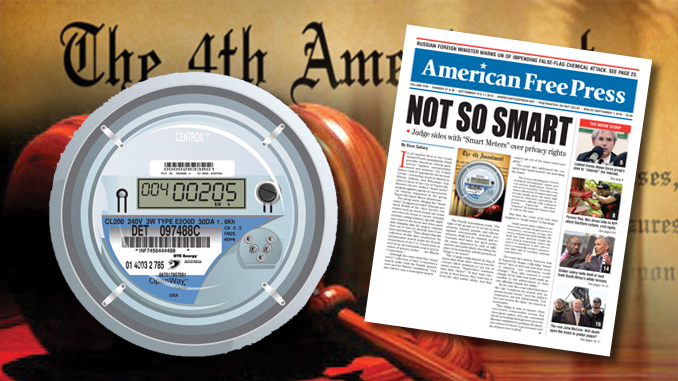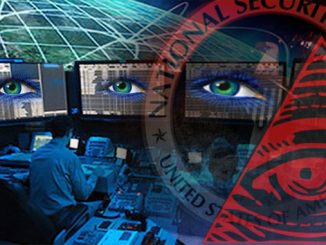
AFP Issue 37 & 38 is now out, and the front page features this story on smart meters. Log in to read now if you’re a digital subscriber, or click here for subscription options. A court of appeals judge in Illinois has sided with “smart meters” over privacy rights in a suit brought by the Naperville Smart Meter Awareness who argued collection of electric use data constitutes “an unreasonable search under the Fourth Amendment of the U.S. Constitution as well as an unreasonable search and invasion of privacy” under the Illinois Constitution.
By Dave Gahary
In yet another blow to the Constitution’s Fourth Amendment, which provides American citizens guarantees “against unreasonable search and seizures,” the United States Court of Appeals for the Seventh Circuit—overseeing courts in districts in Illinois, Indiana, and Wisconsin—has ruled in favor of the City of Naperville, Illinois’s electric utility’s “smart meter” program against a group of concerned local citizens organized as the group Naperville Smart Meter Awareness.

The group sued, alleging the “smart meter” program revealed “intimate personal details of the city’s electric customers such as when people are home and when the home is vacant, sleeping routines, eating routines, specific appliance types in the home and when used, and charging data for plug-in vehicles that can be used to identify travel routines and history.” They alleged that the collection of this data constituted “an unreasonable search under the Fourth Amendment of the U.S. Constitution as well as an unreasonable search and invasion of privacy under . . . the Illinois Constitution.”
Although the court ruled that “smart meter” collection of data “constitutes a search under both the Fourth Amendment and the Illinois Constitution,” they also ruled it was a reasonable search.
The Fourth Amendment reads, “The right of the people to be secure in their persons, houses, papers, and effects, against unreasonable searches and seizures, shall not be violated, and no warrants shall issue, but upon probable cause, supported by oath or affirmation, and particularly describing the place to be searched, and the persons or things to be seized.”
The 13-page ruling issued on Aug.16 states that while other cities across the country allow residents to opt out of smart meters, “Naperville’s residents have little choice”: “If they want electricity in their homes, they must buy it from the city’s public utility. And they cannot opt out of the smart-meter program.”
The court also addressed the certainty that “smart meters” are searching the home:
The ever-accelerating pace of technological development carries serious privacy implications. Smart meters are no exception. Their data, even when collected at 15-minute intervals, reveals details about the home that would be otherwise unavailable to government officials with a physical search. Naperville therefore “searches” its residents’ homes when it collects this data.
But then the court even lent their support to “smart meter” technology:
Smart meters allow utilities to reduce costs, provide cheaper power to consumers, encourage energy efficiency, and increase grid stability. We hold that these interests render the city’s search reasonable, where the search is unrelated to law enforcement, is minimally invasive, and presents little risk of corollary criminal consequences.
The court did caution, however, that if Naperville began collecting “smart meter” data at intervals less than every 15 minutes, “our conclusion could change.” They also warned it could change “if the data was more easily accessible to law enforcement or other city officials outside the utility.”
In the end, the court ruled that since the city “conducts the search with no prosecutorial intent,” and the utility’s employees, not law enforcement, “collect and review the data,” the search is reasonable.
This ruling is sure to impact other concerned communities across this once-great nation, who are concerned about increasing infringement upon the liberties enshrined in perhaps the greatest contract between a government and its citizens ever crafted.
Dave Gahary, a former submariner in the U.S. Navy, prevailed in a suit brought by the New York Stock Exchange in an attempt to silence him. Dave is the producer of an upcoming full-length feature film about the attack on the USS Liberty. See erasingtheliberty.com for more information and to get the new book on which the movie will be based, Erasing the Liberty.





In what way does it matter how they gather information about you that you freely provide? If you provide information, you should be moxie enough to know that it will be gathered and stored for as long as it is of value. I don’t have any electrical meter on the electrical grid that I haven’t been on since 1984.